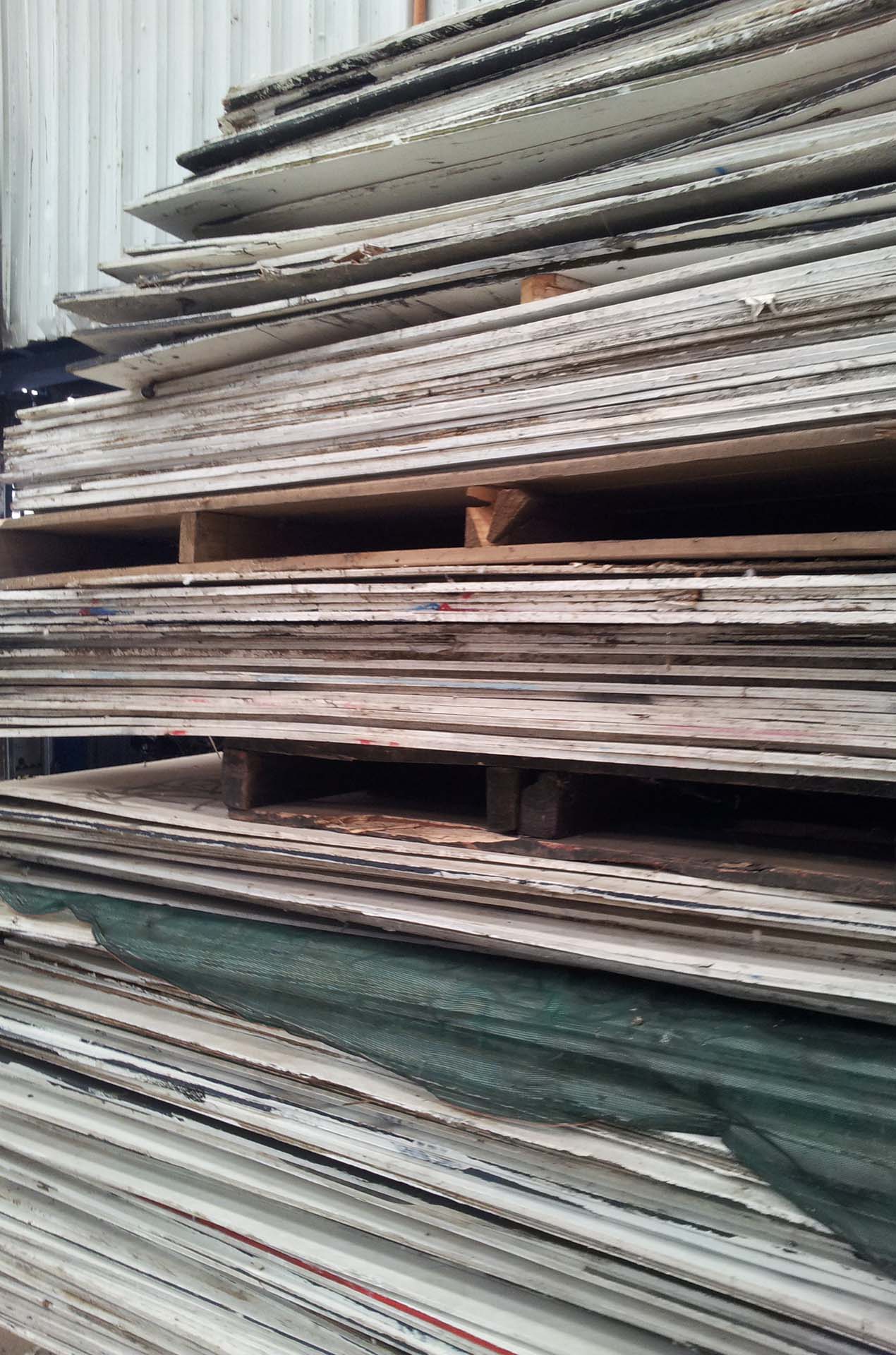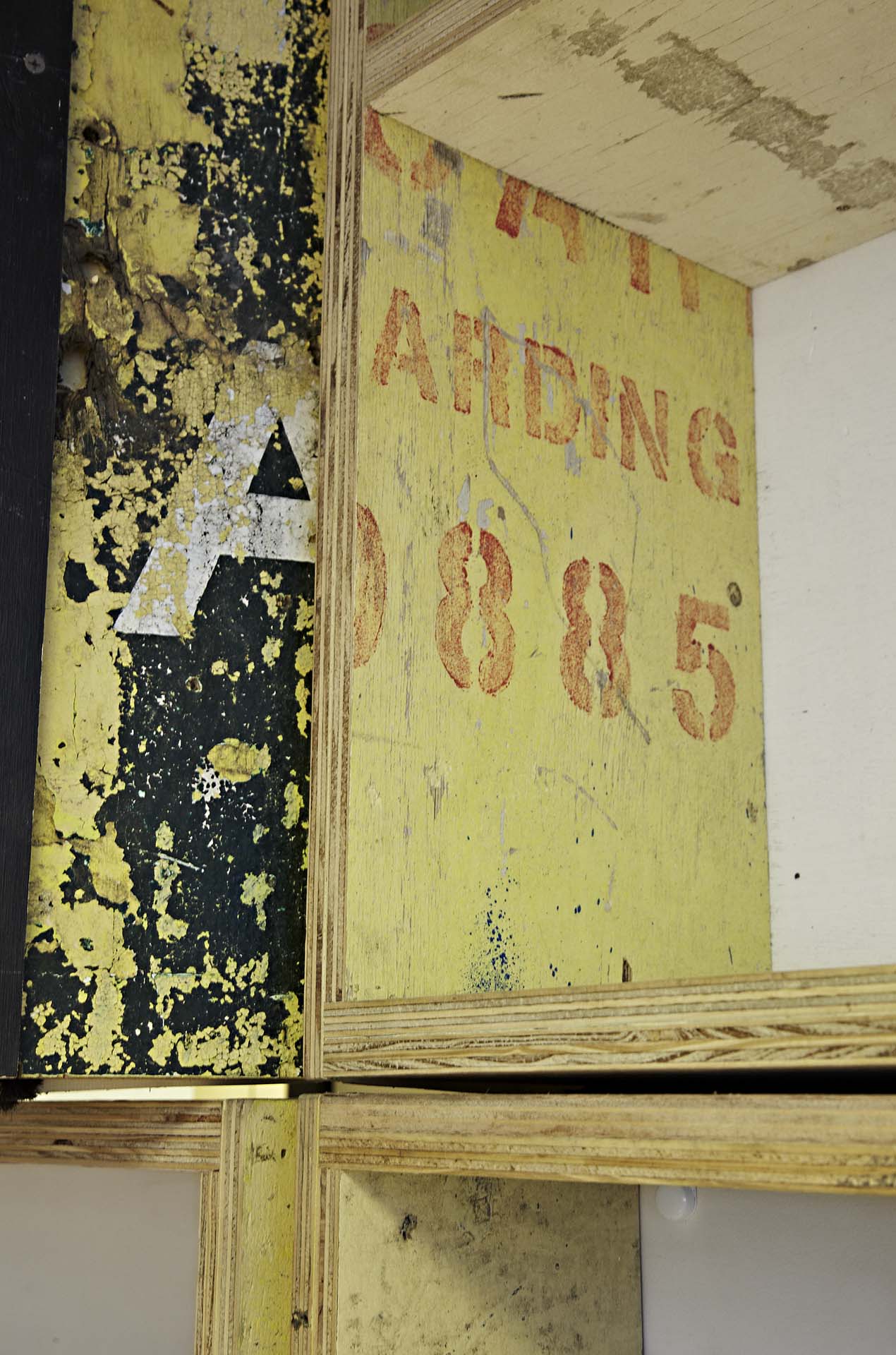UnWaste BookCase
Melbourne, Victoria
Playful and inventive, the UnWaste bookcase transformed an inner-city apartment from a conventional ‘open plan’ blank canvas, into something else, part James Bond, part Transformer, a joinery unit with a hidden agenda. How do you fill-in half a wall in a split-level open plan warehouse conversion in Melbourne’s CBD so that it still allows light, airflow and maintains openness while providing privacy? You need something that moves; a moving something that is also functional and has the least environmental impact possible - a full wall rotating bookcase made from 100% reclaimed plywood from the front of construction sites. The James Bond inspired solution involves a 4.6 metre high by 3.8m wide rotating library allowing books to be stored and accessed from either side, while maximising air-flow and light when needed by simply pushing on the corner to allow 360 degree rotation of the top 6 units.

 Generating the
least environmental impact possible was paramount with this project. Using
conventional ‘virgin’ MDF, Timber or Melamine as the principal material for the
bookcases, all came with unacceptable environmental impacts for our client,
impacts that threatened to derail the project. The solution came via the
collaboration with cabinetmaker David Waterworth, who specializes in using
reclaimed and recycled materials in his work. David’s suggestion and ability to
source up-cycled plywood, not only solved the impasse, but greatly enriched the
design outcome. The principal material used in the UnWaste Bookcase comprised
of plywood originally used as hoardings around construction sites throughout
Melbourne.
Generating the
least environmental impact possible was paramount with this project. Using
conventional ‘virgin’ MDF, Timber or Melamine as the principal material for the
bookcases, all came with unacceptable environmental impacts for our client,
impacts that threatened to derail the project. The solution came via the
collaboration with cabinetmaker David Waterworth, who specializes in using
reclaimed and recycled materials in his work. David’s suggestion and ability to
source up-cycled plywood, not only solved the impasse, but greatly enriched the
design outcome. The principal material used in the UnWaste Bookcase comprised
of plywood originally used as hoardings around construction sites throughout
Melbourne. 

This use of salvaged plywood, originally destined for landfill, is a practical and innovative example of Upcycling, waste diversion and impact minimisation. Upcycling is reusing a material without degrading the quality and composition of the material for its next use. By diverting the material from general landfill, the UnWaste bookcase project not only reduced waste – in this case reducing landfill volume by 50 sheets of ply, which is nearly 1 Ton of material. But also, in sourcing and using a landfill-destined material it reduced the amount of virgin timber stock required to be extracted from the natural environment – with associated benefits of reduced transportation, reduced water and electrical consumption and associated carbon footprints. Aside from the environmental benefits, the bookcase is a uniquely engineered solution. Mimicking the existing centre pivoted windows in the apartment, the movement of the bookcases allow them to be configured in different directions, opened to allow airflow and light as well as providing a large storage area for the client.
Over recent years, Melbourne’s laneways’ gritty urban character have justifiably been increasingly celebrated as an essential part of the city’s heritage and atmosphere. The laneways attract an expanding range of visitors, eager to sample our city’s urban heritage. The layering of history, use and occupation evident in the laneways and around the CBD is testament to the richness of our urban heritage, one that is increasingly cerebrated at home and abroad. The UnWaste bookcase, located within Melbourne’s central CBD, doesn’t just reference this character, it literally co-ops and adapts it to a new setting. By UpCycling, 50 sheets of construction hording plywood, the project literally embodies the heritage of the urban experience of the CBD. The essence of UpCycling is to re-use a material without destroying its material properties, the UnWaste Bookcase does just this – taking and celebrating the character of the original material, retaining the layers of graffiti, posters, and weathering of its former life, and exposing this as an essential aspect of the design, harmonizing with the industrial aesthetic of the converted warehouse apartment.
While the project is very much a bespoke design for a unique brief and site, it can also be considered a prototype for UpCycleing design strategies in cabinet-making and architectural joinery, both within our own design practice and the broader design industry. We hope that the high levels of press exposure the project has received, will lead other designers and design commissioners to consider the use of salvaged materials, over virgin materials, in future projects Potentially leading to significant environmental benefits for the community, by reducing the amount of virgin timber stock required to be extracted from the natural environment and processed – with associated benefits of reduced transportation, reduced water and electrical consumption and associated carbon footprints.
Builder: Against the Grain (David Watersworth)
Photography: TMPhoto